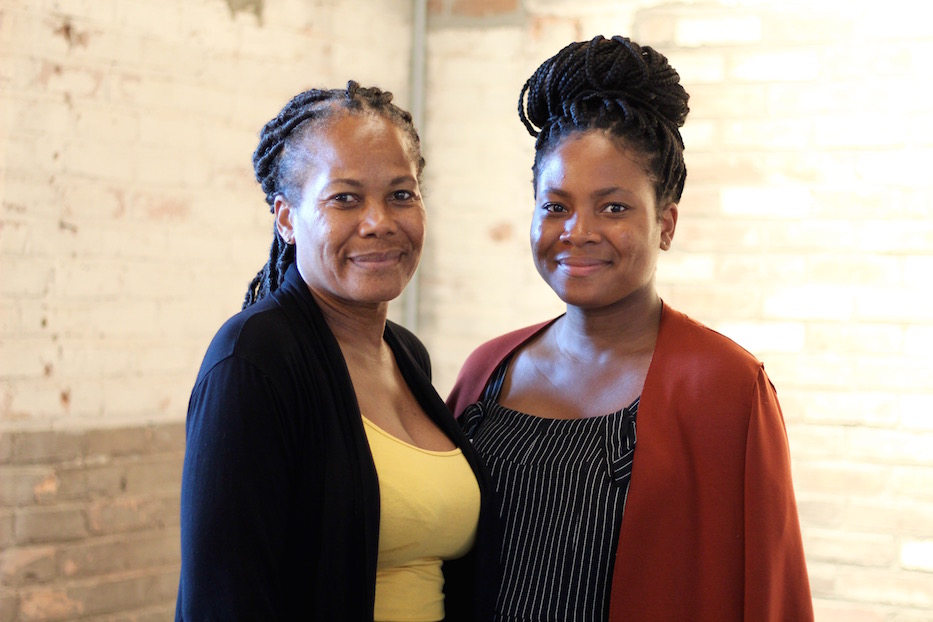
Collab New Haven | Culture & Community | Dixwell | NXTHVN | Arts & Culture
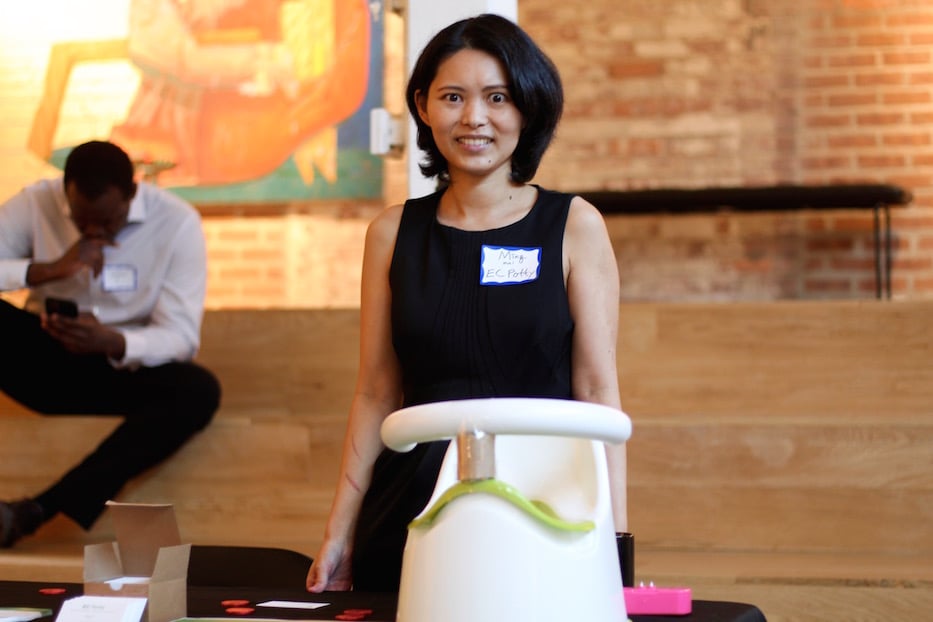
Ming Hui, creator of EC potty. It is one of nine ventures in Collab's 2022 Spring Accelerator cohort. Lucy Gellman Photos.
A pint-sized toilet, designed to make potty training easier on both families and on the environment. A self-care regimen for Black women in educational leadership, who often put themselves last. A mother-son catering operation that channels Guatemala from a ghost kitchen on Whalley Avenue. A mobile office offering rental space in “micro-time,” which happens to be how many entrepreneurs read a clock.
And pockets. Deep, Tik-Tok trend defyingly good pockets that may make wearers think twice about fast fashion.
They are just a few of the nine ventures in this year’s Collab 2022 Spring Accelerator, the first cohort to cycle through and finish under Executive Director Dawn Leaks. Wednesday, the budding entrepreneurs and their friends, families, and mentors gathered at NXTHVN on 169 Henry St. to celebrate in an intimate, at times bashful, pride-filled and laughter-flecked graduation ceremony.
Ventures represent everything from smarter approaches to potty training to a stationary company meant to keep entrepreneurs on track. From February through June of this year, all nine projects worked with Venture Managers George Black and Ndubisi Okeke to hone their ideas, meeting mostly online with what Black called “a few touchpoints in person.”

Dr. Shanta Smith of Herjourns Leadership Solutions. Lucy Gellman Photos.
Of the nine, seven ventures are led by women of color; two of the seven are led by immigrants. Two of the ventures, Christian Farrad’s Hip-Hop Exec Academy and Gabriela De Jesús’ Bright Raven Studios, were unable to make it Wednesday. Several of the entrepreneurs also grew up in and around New Haven, and called the graduation a full circle moment.
“One of the things that drew me to Collab was the staying power of our ventures,” Leaks said Wednesday, before welcoming cohort members to receive their certificates from Black and Okeke. “I think that speaks to the tenacity of our entrepreneurs.”
All said at points throughout the night that they have new tools to succeed. Of 111 ventures that Collab has graduated since 2017, Leaks said that 87 percent remain active. Two of those—Aaron Lee’s catering outfit Heartfelt Eating and Maxine Harris and Laurren Robinson’s business Je T’aime Cupcakes—provided food for the graduation. Every so often, hints of spun sugar, caramel, mac and cheese, curried vegetables and steaming cornbread wafted over the room from the catering setup.

Dawn Leaks, executive director of Collab. “One of the things that drew me to Collab was the staying power of our ventures,” she said Wednesday. Lucy Gellman Photos.
Throughout the evening, attendees saw, heard about, and networked their way through the tenacity that Leaks mentioned in real time. Taking the mic early in the evening, entrepreneur Ming Hui presented the “EC Potty,” which uses the science of elimination communication or EC to make potty training easier for parents and their diaper-dependent children.
Currently in the prototype phase with MakeHaven, the portable, tiny potty uses a sensor and audio cue to help toddlers connect a single sound with the process of elimination—or what most people would simply call going to the bathroom. Most parents use verbal EC at some point, making a ssssh ssssh ssssh sound to represent urination and a mmm mmm mmm sound or guttural noise for defecation.
A relatively new mom herself, Hui said she first became interested in the concept when she learned that babies can be potty trained as early as 18 months—well before the two-year start mark that American parents read and hear about from their pediatricians. As she dug into research, she learned that EC is much more common in countries that don’t have the same access to disposable diapers as the U.S. Growing up in China—she moved to Boston when she was 10—Hui was out of diapers by the time she was two, thanks to the process.
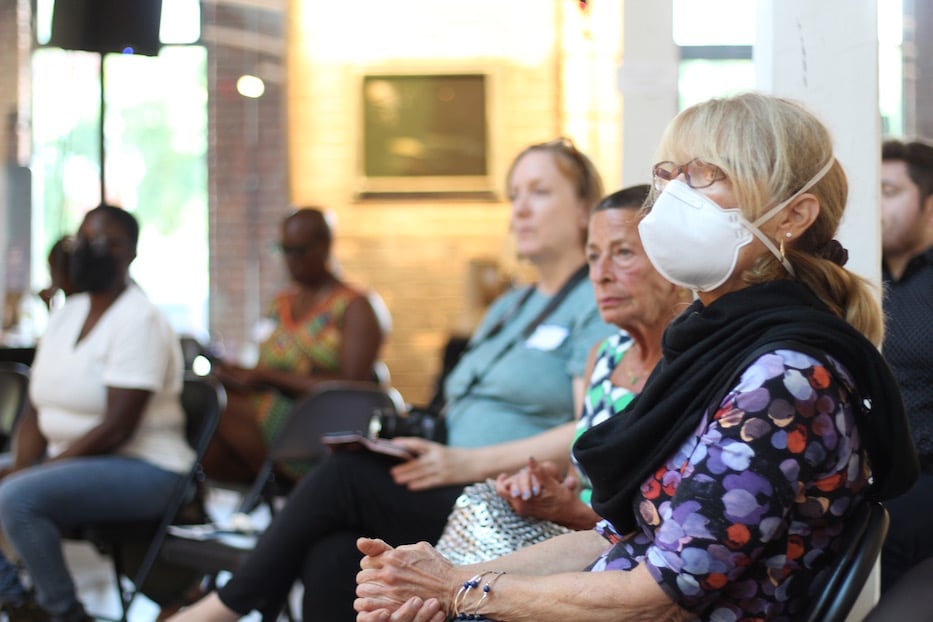
Ten months ago, she began EC with her infant daughter Alexis, who was then just nine months old. She found that the baby was surprisingly responsive—but that EC got harder when Alexis started to move around, stand and toddle on her own. The prototype has some of her own EC lessons built in: like a curved support bar at the front, designed so babies won’t tumble forward if they drop a toy while on the potty.
It’s also a move toward a more sustainable world, she said. Once they are in the landfill, disposable diapers take 500 years to deteriorate—meaning that the diapers parents use right now will not break down until the year 2500. And yet, the long road to potty training is a relatively recent intervention. The first disposable diapers did not hit the market until the late 1940s. Pampers did not become widely available until 1961.
Before that time, kids were potty trained earlier because it made practical sense. Now, some toddlers stay in diapers up to ages three and four. The result is an environmental hazard that is literally growing in metric tonnage by the year.
“The longer they’re in diapers, the longer it takes to get out of them,” she said. She thanked Black and Okeke for helping her transform a kernel of an idea into a testable product over the last several months. The EC potty, of which she provided a handmade prototype Wednesday, is in its first stages of prototyping at MakeHaven.
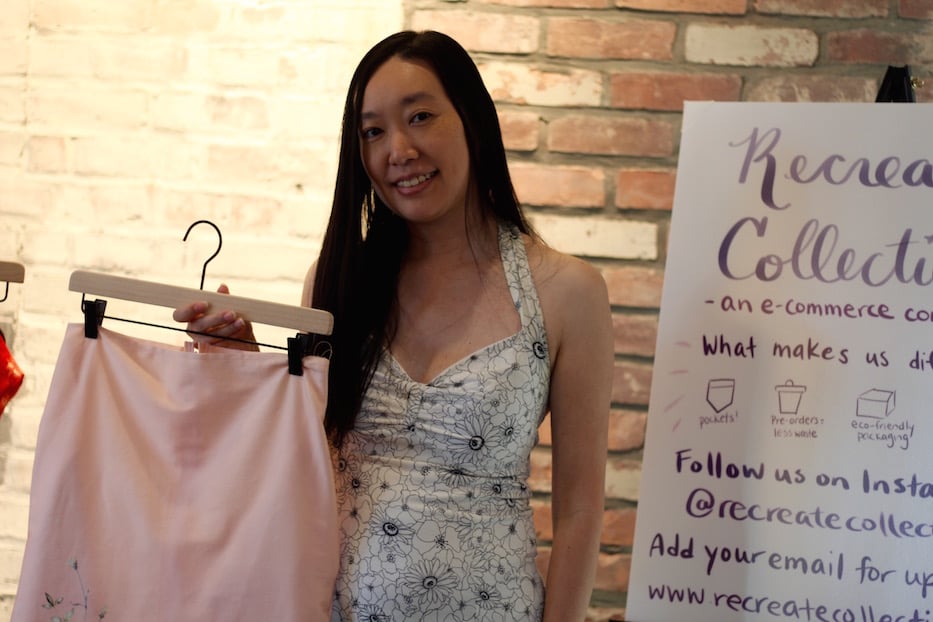
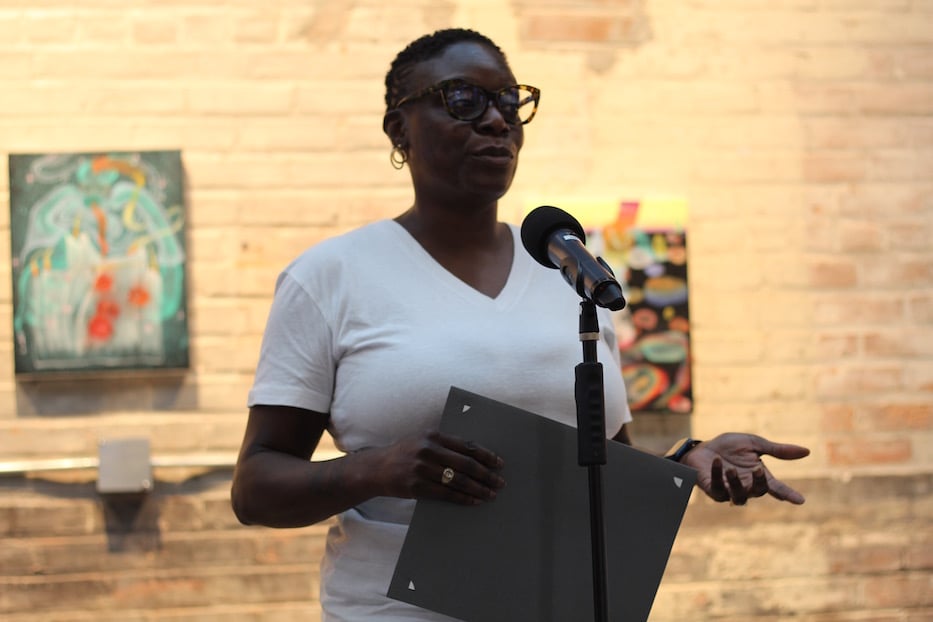
Top: Monica Lee introduced attendees to Recreate Collection. Bottom: Melissa Lytrelle Singleton of NewSpace. Lucy Gellman Photos.
EC Potty was just one way that cohort members pitched mutual support and functionality through entrepreneurship Wednesday night. In NewSpace, lifelong New Havener and home notary Melissa Lytrelle Singleton outlined a mobile coworking and office space that entrepreneurs could rent by the half hour, a unit that she described as “micro-time.” She explained Wednesday that she began with the idea of a mobile notary, and grew from there, challenged by Black and Okeke to think more broadly.
Raised in New Jersey and now based in Hartford, Monica Lee introduced attendees to Recreate Collection, a new slow fashion business that turns out skirts, dresses and pants with functional pockets. Designs are made on a per-order basis, in an effort to both reduce the fashion industry’s waste and cater to customers of all sizes.
Like Hui, she sees Recreate as a move toward environmental sustainability, particularly in an industry with a significant carbon footprint. She said she is using both Collab’s guidance and the skill set she built working at the fintech startup Zeal for eight years in New York City.
During the accelerator, she redesigned the homepage to her website and sewed prototypes, including a coral-colored skirt with deep, satisfying pockets (large enough to fit an Android phone and then some, she said) and a matching floral halter top.
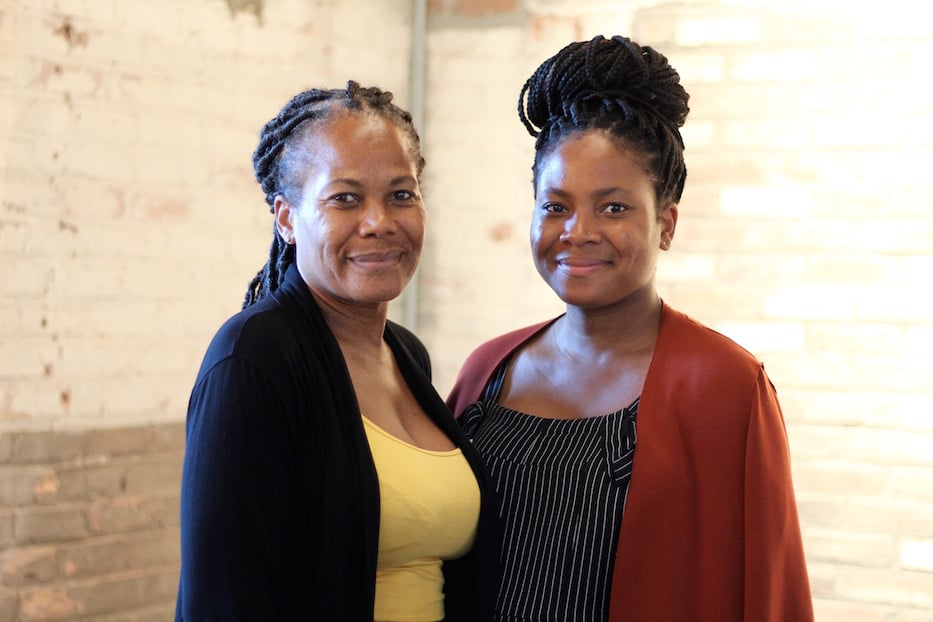
Hartford-based entrepreneur Danielle Russell (at the right) and her mom, Sheryl. Lucy Gellman Photos.
The founder and CEO of “Uncommon Work,” Hartford-based entrepreneur Danielle Russell dreamed up a stationery company as an homage to her mom Sheryl, a Jamaican immigrant who became a doting mother to seven kids, registered nurse, and three-time-over small business owner. Watching her mom as a kid, Russell said, she saw that her mom never stopped. “I wanted to find a way to make her work easier,” she said.
The result was Uncommon Work, a new stationary and planner-based guide built for entrepreneurs to stay on track. When people choose to go into work for themselves, Russell said, she knows that it can be hard to stay focused. In Uncommon Work, she addresses the disconnect with a series of prompts centered on people’s goals and core values. It currently exists only on social media, although she is building out a website. Wednesday, Sheryl beamed as her daughter walked attendees through her business model.
"In my journey, I’ve realized that I need a community,” she said. “This journey is really crazy and it's scary … and I’ve learned that I’m not alone.”

Dr. Shanta Smith. Lucy Gellman Photos.
Other projects deepened the commitment to community that Collab has so baked into its mission. Born and raised in New Haven—and a proud product of its public schools—recently-minted Ph.D. Shanta Smith sketched out a venture dedicated to “radical self-care” as an act of resistance, particularly among and for Black women in school leadership.
Named “Herjourns Leadership Solutions,” Smith’s venture is a product of her doctoral research at the University of Pennsylvania, in which she discovered that Black women principals were not getting the training, development, or support they needed to succeed. Instead—and across urban, rural and suburban school districts—many reported “intersectional identity-based discrimination.” It was a trend that Smith knew all too well.
For Smith, who served as the principal at New Haven’s Edgewood School until 2019 and then left to lead Hamilton Avenue School in Greenwich, it marked a realization. She wanted to do for other Black women in leadership what someone with more scaffolding and training might have done for her. She called the venture “a big dream for me” that will, in its best version, provide support for a community of teachers that often hold everything else in place.
“What I have learned, both within my practice as a principal and in my dissertation … is that learning to care for oneself must be deemed so important that it assumes an urgent and radical nature,” she writes in a paper that she published at the University of Pennsylvania, and handed out copies of Wednesday. “Black women must prioritize nourishing our minds, bodies, spirits and souls through the investigation of self-care strategies that meet our unique needs and stresses.”
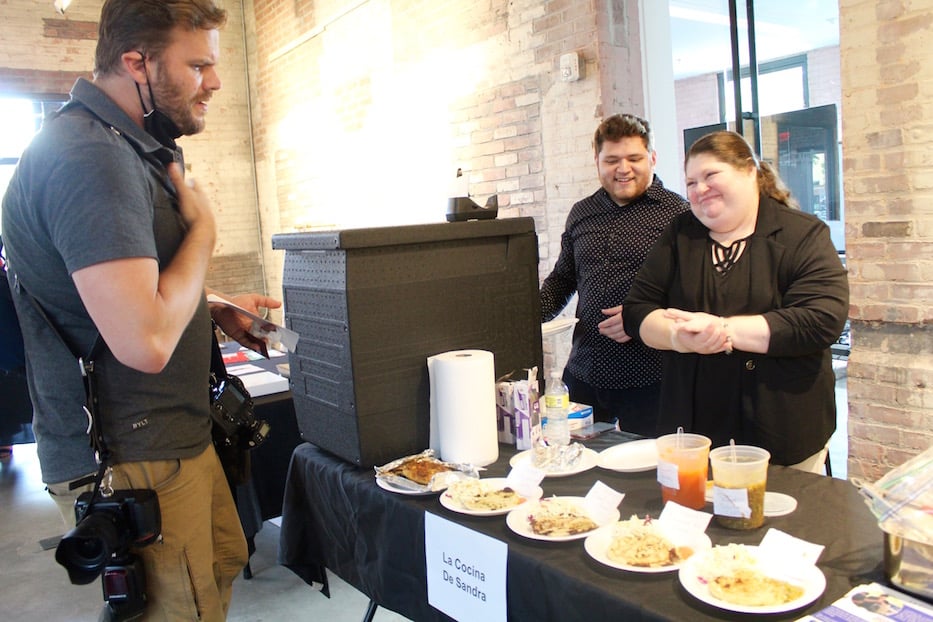
Photographer Joel Calloway with Elmer Galvez and and his mother Sandra Trigueros of La Cocina De Sandra. Lucy Gellman Photos.
As they served up chicken and vegetable tamales, spicy tomatillo relish and a mild tomato sauce, peppery cabbage slaw and pupusas stuffed with beans, spinach, cheese and meat, mother and son team Sandra Trigueros and Elmer Galvez pitched La Cocina de Sandra as a path back to their Guatemalan roots—and to a sustainable small business without a brick-and-mortar home.
The two began their culinary journey in 2016, when Trigueros’ rheumatoid arthritis became so severe she could no longer work outside of the family’s West Haven home. A Guatemalan immigrant who came to the U.S. in 1995, Trigueros turned to her family’s recipes and started making enough dishes to feed the neighborhood. At Christmas, she became known for her tamales, which she prepares with a thick recado sauce and serves wrapped in banana leaves.
For her and for Galvez, who for years went to Common Ground High School, it marks a significant step forward for the business. Last year, Trigueros went through Havenly’s training program, which gave her some of the business acumen she needed to get off the ground. Now, she and Galvez also have Collab’s guidance on setting up a business plan and trying out a venture with different audiences. When their West Haven kitchen is not large enough, they work out of Big Time Deli & Pizzeria on Whalley Avenue, which Trigueros’ brother owns.
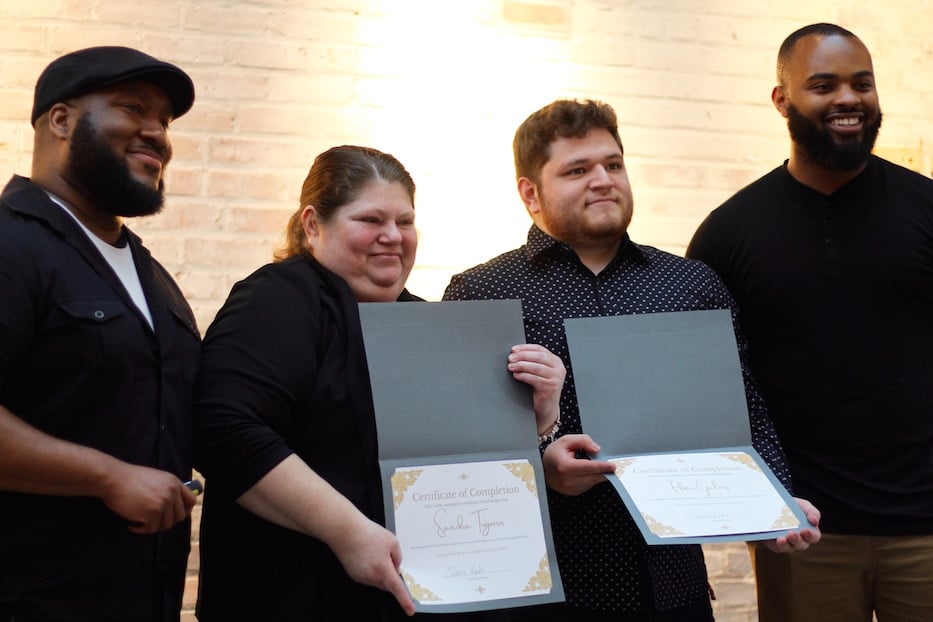
Venture Manager George Black, Sandra Trigueros, Elmer Galvez and Venture Manager Okeke. Lucy Gellman Photos.
“Now I know that my dream can come true and I’m very excited about it,” she said, getting choked up as she spoke. Every so often, she and Galvez stopped answering interview questions mid-sentence to receive praise from an attendee who had tried their food, and was back to politely ask if there was more.
“Before we started Collab, we had no idea what we were doing,” Galvez said. For the moment, he and his mother are sticking with the catering business only, instead of a potential brick and mortar storefront. It reflects a wider trend: ghost kitchens exploded in the pandemic, as takeout orders soared and chefs swapped the crippling cost of overhead for the chance to experiment, beta test and whip out delivery service on a smaller budget. Because of the family hookup, Big Time Deli & Pizzeria gets the job done without soaring costs of kitchen time.
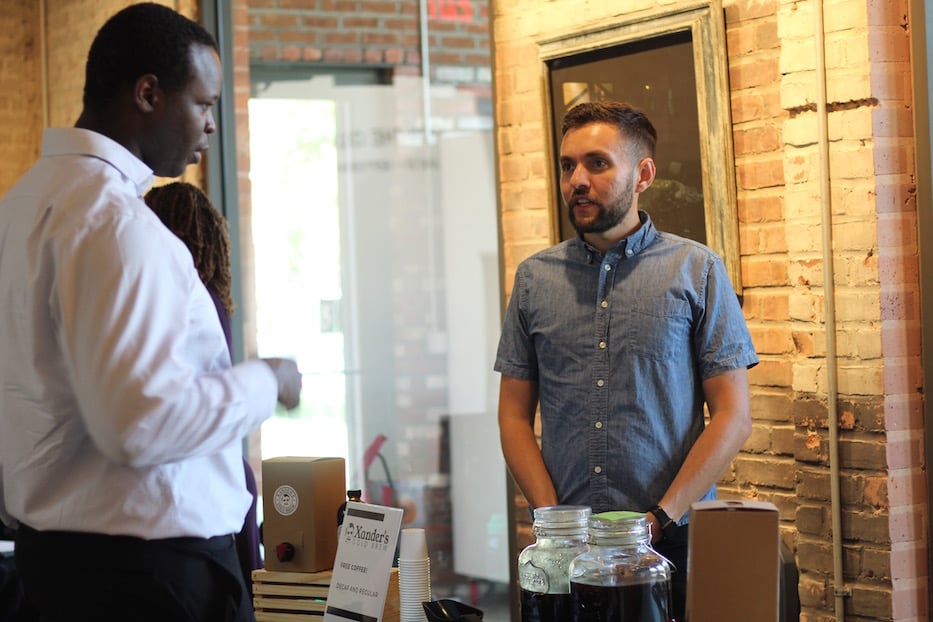
Daniel Miller of Xander's Cold Brew. Lucy Gellman Photos.
Even after presentations, the buzz of conversation filled the room, sailing over loud music and a few squeals of delight as friends caught up. At a table close to the entrance, Daniel Miller offered up shots of cold brew coffee, part of his evolving, Bridgeport-based venture Xander’s Cold Brew. In the heat of Wednesday afternoon, he doled out small cups of both regular and decaf, fishing around a cooler for ice. The brew hit on a silky-smooth note, with whispers of cherry and a bursting, round sort of finish.
Named after his son Xander, Miller’s cold brew dream was born almost a decade ago, after he tried coffee at a friend’s house and—many cups later—became a self-described “coffee snob.” For years, he took his hot coffee with milk and sugar, the acidic bite too much for him otherwise. The first time he had cold brew—which is steeped overnight, to be more caffeinated and less acidic—it was a revelation.
He has now perfected his own recipe, for which he contracts with Topeca Coffee Roasters in Tulsa, Oklahoma. Miller sells a regular cold brew made with beans from El Salvador, and a decaf blend with beans from Colombia. Topeca, which notes in its mission that it is small-batch, independently owned and fair trade, has farms in both countries.
Naming the business was easy, he said: it honors his four-year-old son’s daily ritual of pulling over a stool to help his dad make coffee. While that began when Xander was just a toddler, he has continued to help Miller with coffee each day. The product, which features a chubby-cheeked, smiling and starry-eyed Xander, is available online, at pop-ups and at local cafes and retailers including Bloom on Edgewood Avenue.
Eventually, Miller said, he would love to have a “cold brewery” and bakery, but still considers the venture his side hustle. He works a full-time job in sales.
“As I think about legacy, I think about the inheritance of confidence and creativity and I want to keep those values close to my heart,” he said.

Making his way around the room, Economic Development Administrator Michael Piscitelli lauded the ventures as adding to New Haven’s creative and professional landscape, particularly as the city grows its small business footprint. In the city, unemployment claims are now down to 900, from over 10,000 in the very early months of the Covid-19 pandemic.
He added that the ventures, many run by immigrants and women of color, dovetail with the city’s investment in cultural equity.
“Long term, the national [economic] headwind will hit New Haven,” he said, applauding each of the business ideas for their commitment to innovation . “It’s very positive that we have a forward thinking trajectory.”

